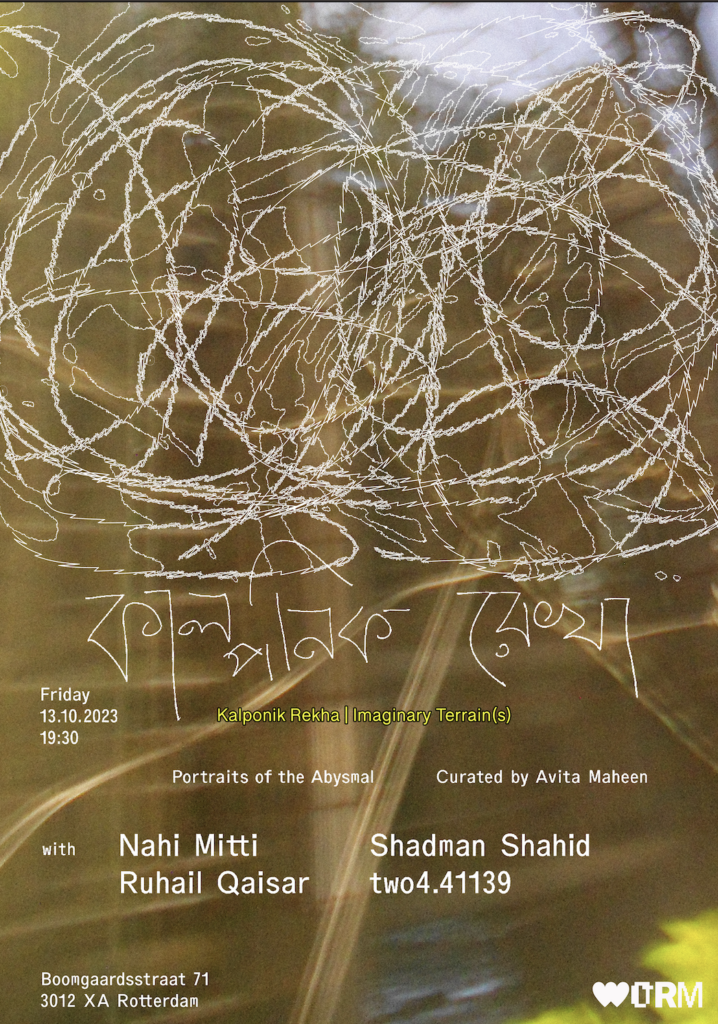KALPONIK REKHA /IMAGINARY TERRAIN WITH RUHAIL QAISAR, NAHI MITTI, TWO4.41139 AND SHADMAN SHAHID

Kalponik Rekha | Imaginary Terrain
Season 2 – Portraits of the Abysmal
কাল্পনিক রেখা / Kalponik Rekha / Imaginary Terrain (s) – driven by fragments of displacement and phenomenological resistance to objectified romanticism ; of relics of an erased history, of the pencil that scattered the soil, of the soil that dissolved our grandmothers grave into the river, of the river that cries when the মেছা ভূত arrives, of longing for the whispers that lie in the trunk of the lace-fita hawker. Portraits of the Abysmal allures and false virtues of absolutist actualizations, neo-engineered divinations and instant commodification, the bestiality of the wrath pinned, painstakingly deflected in the remarkable despair and whimsical satire of South Asian artists, with Ruhail Qaiser, Nahi Mitti, two4.41139 and Shadman Shahid.
two4.41139 (BD/NL) is the moniker of Avita Maheen, Bangladeshi media artist based in The Netherlands. Their work develops sensory sound and non linear narratives, crafting a moment of anecdotal history and absurdist values. Weeping on the existence of the world, and the non existent promises of future nostalgia, their work Slope of the Secant line is driven by the embryonic desire to be held and the lack of palliative interest in post colonial, post partition, post genocide, post famine, globalized (third) world, on the mundane choices of our daily perception, a by-product of our post-colonial fantasies and upper class dreams, and portray our collective nonchalance in a growing hyperindividualism, questioning the answers we already know, of what fruit an apolemic tree bears, in the final age of the world, encompassing 1200 divine years of conflict.
The project is supported by Ukrainian sound artist and composer Anna Khvyl.
Shadman Shahid is a photographer born and raised in Dhaka, the capital of Bangladesh. His work is about the precarity of the corporeal and the spiritual human conditions in contemporary society. His photographic methodology straddles the line between documentary and fiction. He is currently based in the Netherlands, and is the Head of the Department of MA Photography and Society, and the interim Academy Director of The Royal Academy of Art (KABK) in The Hague. Prior to moving to the Netherlands, he was a lecturer at the Pathshala South Asian Media Institute.
Nahi Mitti is an artist, DJ and producer based in the UK: last night, they had a dream they could float and cheekily told someone how to start meditating – a bit odd, they teeth and a little tongued, as they walked down the very smooth and very VERY large space with white walls and wood accents and easy breezy blocks of grey that had dapples of, well actually not, sweat swept over the head of Nahi Mitti who sallied forth, actually nooo they jetéd – did they know what they were doing? Or where they were going, unglued and yet as the glue floatingeth in the ladies and gentlemen – um yes, actually they dideth: they were going to wander round the block and sweat into the air, past the long glass that made another one, another one a … chhoo, like the hetup water rising into the air, I care, my hair, there, were, that time they were late, caught in rain in grey tshirt borrowed from sister (sorry!) flew up stairwell into the white-grey room like a sutured ni ni ni ni niiihh, teeth and cheeks and n-n-n-n-no-one will ever believe this but… they stood the rain, and all the sky, and all the hair in their face.
Ruhail Qaisar is a self-taught artist from Ladakh. As a musician, he explores the confines of memory, the dry rot of intergenerational trauma, and the eerie swarms of the human unconscious, incorporating vernacular concepts, poetic gestures, and mangled improvisational chaos. The work serves to transmit sub-zero sound-collage memoirs based on real-life events and local mythos, as developed through his recollections of growing up in the frontier villages of the Ladakh region located in the high-altitude Himalayas, drones of hauntology disgracefully disturbed with spastic tremors of post-industrial delirium and cruel power-electronics. His debut album Fatima is out on Danse Noire. Ruhail Qaisar’s Fatima is a requiem for a dead future. The debut album release by the self-taught artist and producer screams with the trauma and decay of life in his hometown of Leh—a high-altitude plateau region in the contested Ladakh area, extending from the Himalayan to the Kunlun Ranges. Qaisar absorbs this external condition of perpetual conflict between nation states into his internal life and resulting compositions, crossing sound art, noise music and experimental filmmaking. Hauntological drones, power electronics and convulsive post-industrial dissonance create an unnerving sense of fear, anger, and alienation. A broken transistor with a knob tuned to the abyss is bombarded with the cries and bitter laughter of a city’s inhabitants tyrannized, not only by military occupation but the soft-power subjugation of the tourism industry.
This is a co-production with Stichting Klangendum/Vroom